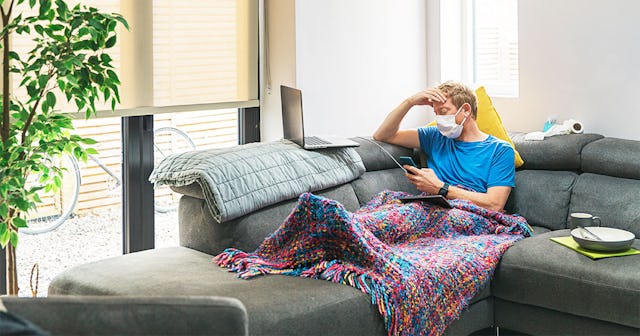How COVID Is Affecting Our Bodies Even If We Don’t Have COVID

When I get stressed, I get this horrible pain down the right side of my neck. It’s pretty irritating, it lasts for days, and it’s one of those pains that makes it almost impossible to safely back up my car because I can’t fully turn my head. Now, listen, I don’t fully understand why my stress decides to squat down in the side of my neck and stay there, all sore and unyielding, but what I do know is that ever since the world shut down because of COVID-19, my neck has been feeling the stress of the pandemic.
My wife, on the other hand, gets lower back pain when she’s stressed. For the past several months I have sat at the table and rubbed my neck after the kids go to bed, as my wife, Mel, stands next to the counter, rubbing her lower back. Sometimes we look at each other, and then, in a loving fashion, agree to a neck rub in exchange for a back rub.
As it turns out, we are not the only people having the stress of living through a global virus come out in physical manifestations. In fact, it’s becoming more and more common of a problem.
Dr. Tony Roberson, a professor at George Washington University and a psychiatric mental health nurse practitioner told NPR that he’s seeing “more physical complaints that are closely linked to psychiatric complaints. Symptoms could be a lot more severe, a lot more prevalent, and a lot more frequent with stress.”
One of the most pressing and common issues is insomnia. According to a recent article in The Harvard Gazette, “sleep is emerging as the latest casualty of the COVID-19 crisis.” And if you think about it, what we are doing to prevent the spread of COVID-19 is a surefire way to cause sleepless nights. Our new schedules have us living sedentary lives, turning off our alarm clocks, and often getting less exercise and less regular access to sunlight. Donn Posner, president of Sleepwell Associates and an adjunct clinical associate professor at Stanford University School of Medicine, told The Harvard Gazette that “[t]he actions that we’re taking to protect ourselves can not only precipitate problems with sleep, but lead to chronic problems with sleep.”
Another common — yet very different — issue coming to light is shock hair loss. Yes, I paused and ran my hand across my scalp at the mention of that as well. According to ABC News, “Shock hair loss can take three to four months to appear after the onset of a stressor. Doctors say it is not an unusual condition, but with financial stress, anxiety and other emotional shocks on the rise due to the global pandemic, the stress of it all can lead to physiologic changes that push up to 50% of your hair prematurely into what is called a shedding phase.” I was chatting with my nephew online the other day, and he has been experiencing this very issue. The most troubling part is that the more hair he loses, the more he stresses about the problem, only causing the problem to feed on itself.
Going back to Dr. Tony Roberson and NPR, stress from the pandemic is no joke, and having it come out sideways in physical manifestations can take a number of different forms. “Fatigue, headaches, lack of sex drive, muscle tension, chest pain, and stomach problems… are common symptoms that are often linked to stress,” Roberson says. And it’s not just doctors and therapists seeing more clients due to pandemic stress. New York-based dentist Michelle Augello tells Scientific American that she’s seen an increase in patients complaining of stress-related conditions such as jaw pain and headaches: “In the morning, they practically have to force their mouth open, to unclench.”
And I bet many of you are sitting here reading this with your jaw hurting or your hair falling out, and wondering what to do about it.
First and foremost, if you have available health insurance, meet with a doctor and/or therapist. I have been meeting with my therapist online for months, and in so many ways it’s been a lifeline. And from everything I’m reading on the subject, most doctors are recommending a pretty simple mental health recipe of sticking to a schedule where possible and engaging in healthy habits like a good diet, exercise, and meditation. Something as simple as regular walks can be a game changer, along with finding ways to stay socially connected via phone calls or Zoom with family members.
But above all, take a moment and realize that this is the reality of living through a pandemic, and it’s okay to feel stressed about it. If you are experiencing physical manifestations of that stress, it sucks, but it’s not unusual. It sounds like a lot of people are sharing your plight. Now is a good time to sit down — preferably with a medical professional — and figure out a way to better manage your mental health, so that your physical health doesn’t suffer too.
This article was originally published on